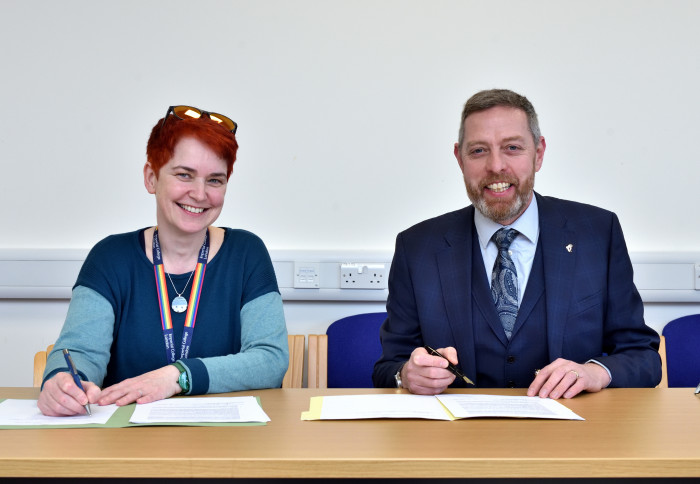Imperial’s I-X to work with RAF for enhanced defence and security in UK

Professor Mary Ryan and RAF Air Commodore Jez Holmes
Imperial and the Royal Air Force Rapid Capabilities Office are to collaborate to tackle national defence and security challenges.
Professor Mary Ryan from Imperial College London and RAF Air Commodore Jez Holmes signed a Memorandum of Understanding (MOU) on Monday to cement the two parties’ commitment to work towards common goals in security.
Protecting the national economy, our security, and our health requires bright minds, innovative technologies, and creative ideas. Imperial has these things in abundance. Professor Mary Ryan Vice-Provost (Research and Enterprise)
The agreement is led by I-X, an Imperial initiative which aims to develop novel approaches for research, innovation, and teaching by harnessing the potential of artificial intelligence, data science and digital technologies.
Vice Provost for Research and Enterprise Professor Ryan said: “Protecting the national economy, our security, and our health requires bright minds, innovative technologies, and creative ideas. Imperial has these things in abundance. We look forward to exploring new opportunities for collaboration with the RAF.”
RAF Air Commodore Jez Holmes said: “Working with academic institutes to develop newer and more innovate ways of working is one of the keys to the Royal Air Force’s ability to exploit emerging technology. We are enthused to be working with Imperial’s I-X and look forward to creating world leading projects with them. Furthermore, we are passionate about supporting the institutions that develop STEM skills for the future of the UK’s defence sector and the Royal Air Force.”
Lead Imperial researcher Professor Kin K Leung, from Departments of Electrical and Electronic Engineering and Computing at Imperial said: “Developing cutting-edge technologies for national security requires long-term collaboration among the best talents. It is our great honour to formalise and enhance our research partnership with RAF for such goals.”

The new agreement will help to further the aims of the Centre for Defence Communications & Information Technology (DCIT), part of Imperial’s I-X initiative and spearheaded by Professor Leung and RAF’s Professor Patrick Baker. The Centre aims to advance technology in artificial intelligence, machine learning and optimisation, wireless communications, computer and sensor infrastructures, blockchain technologies for secure communications, and quantum computing.
It is our great honour to formalise and enhance our research partnership with RAF for such goals. Professor Kin K Leung Department of Electrical and Electronic Engineering
The Imperial team will feature a collaborative, multi-disciplinary cohort of academics including Professor Leung, Professor Bruno Clerckx from the Department of Electrical and Electronic Engineering, Professor William Knottenbelt from the Department of Computing, and Professor Myungshik Kim from the Department of Physics; with additional staff joining the team as the programme develops.
As well as looking to tackle key security challenges, the Centre will promote academic publications, application of developed technologies in civilian domains, establishment of start-up companies, and training and nurturing of future research talents in security and resilience science and technology.

Ceremony photos: Jo Mieszkowski/Imperial College London
Article text (excluding photos or graphics) © Imperial College London.
Photos and graphics subject to third party copyright used with permission or © Imperial College London.
Reporter
Caroline Brogan
Communications Division